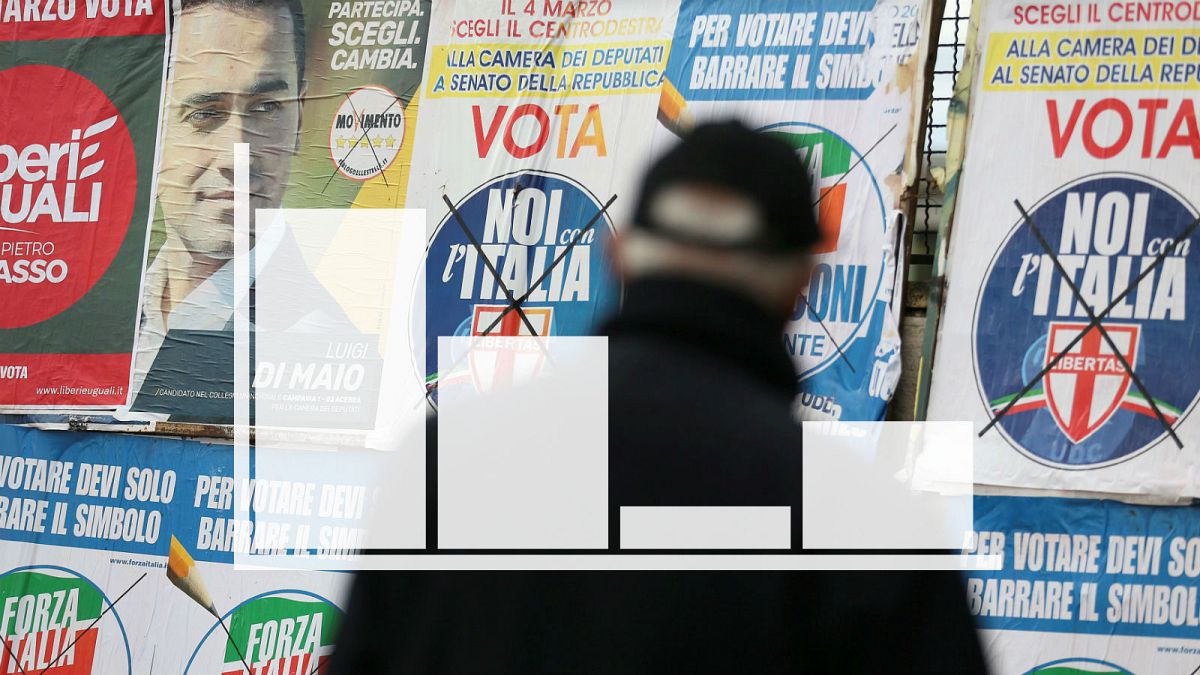Italy is going to the polls on Sunday, March 4. Here we look at the data behind the key election issues.
Immigration is the key issue
The shooting of five migrants by Italian Luca Traini in early February catapulted immigration to the top of the election agenda.
It was already a hot topic. As this chart shows Italy has been taking more and more of Europe’s immigrant burden.
“Of course Italy is the destination of all the people arriving from Libya,” said Daniele Albertazzi, an expert on Italian politics from the University of Birmingham.
“These numbers have come down in the last year but there is a very visible flow of people and if you go to Italian cities you can see these people stranded there."
It has meant populist parties, who have a tough line on immigration, have enjoyed a strong showing in opinion polls.
That has had a knock-on effect on centrist politicians, who have moved to the right in a bid to steal the thunder of the populists.
Unemployment 'fuelling the anger of voters'
Experts say Italy’s unemployment, which was 11.2% last year against a European Union average of 7.7%, is fuelling voters’ anger.
Meanwhile the country’s youth unemployment — those under the age of 25 and out of work — is one of the highest in the bloc.
It stood at 34.8% in 2017, down from a high of 42.7% three years earlier.
“The generation of people who are below 40 have really had a very bad deal and this is what fuelled the initial success of the Five Star Movement,” said Albertazzi. “This issue of a generational-divide is as serious as it is in the UK.
“It’s really explosive because you have a generation of older people in Italy who have a pension and are relatively okay-off. Then you have the people below 40 who in many cases are working on the basis of temporary and casual contracts.”
Is this why Italy won't quit the Eurozone?
Populist parties are set to win more than 40% of votes, if final election polls are to be believed.
There has been speculation that if the likes of the Five Star Movement get into office the country could hold a referendum on quitting the Eurozone.
But experts dismiss this and argue one of the key reasons for this is the amount of Italy's exports that go to other EU countries.
Italy was the fifth biggest exporter to other states in the bloc in 2016, according to statistics from Eurostat.
Around 85% of its total exports were from Italy's manufacturing sector.
“It’s complete science fiction," said Albertazzi, asked about the chances of Italy agitating to leave the Eurozone if a populist party got into power.
"Firstly you can’t have referendums on international treaties under the Italian constitution.
“Then, even if you do have a government that wants to do it, I think it is absurd because of the economic link between Italy and the Eurozone.
"Italy is a major manufacturing power and the exports go to the other countries of the Eurozone."
Italy's debt problem
Government debt In Italy — as a percentage of the country's gross domestic product — is one of the highest in the EU.
Only Greece is worse.
Experts say the election outcome will have an impact on how the debt is tackled, with wider possible ramifications for the Eurozone.
“The biggest risk is less the positions a new government will take and more how the financial markets may react to that risk," said Albertazzi.
"If Northern League and Five Star Movement do well and there’s a general sense that things are going badly then there might be speculation against Italian banks, some of whom are very much indebted."
How corruption is helping populists' cause
Experts say there is deep mistrust of official institutions in Italy and this is fuelling support for populist parties.
Italy was ranked as one of the most corrupt countries in the EU in Transparency International's latest Perceptions of Corruption Index.
“I think a lot of anger in the Italian population is fuelled by concerns about the economy and dissatisfaction with the functioning of the state,” Stefan Lehne, a visiting scholar at European think-tank Carnegie Europe, told Euronews. “Corruption plays a role too, it’s a big issue in Italy."
Albertazzi said: “You have really widespread scepticism in Italy that translates into this sense you are powerless and there is nothing you can do to improve your own position.
“This fuels anti-elite, anti-politician rhetoric. It’s interesting that the people quite good at voicing this rhetoric are people who have been in politics for decades!
“Berlusconi is the most-seasoned politician in Europe and the oldest party in the Italian parliament, Northern League, together with the Five Star Movement, are very good at fuelling this sense of desperation and the feeling that the country’s political institutions are working against the interests of the people.”
